The struggle to bring up Tamimi, a 13-year-old with brittle bone disease
What does it take to care for a child with disability, when even an act of holding him too hard would break his bones? On The Red Dot takes an intimate look at the challenges three families face.
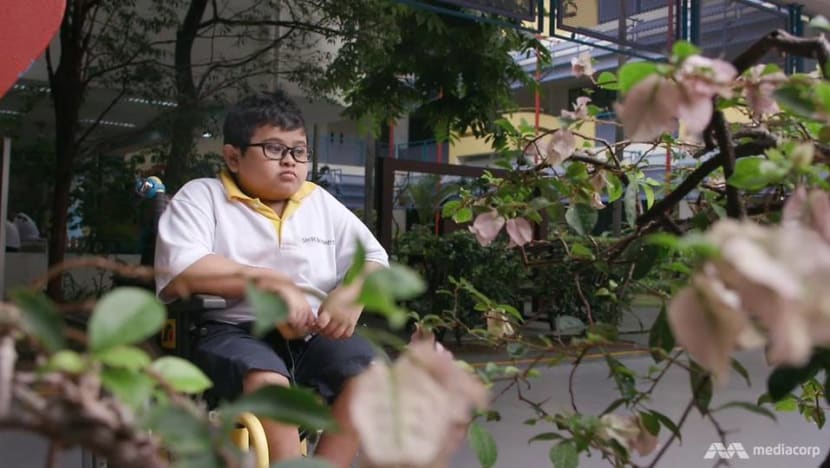
SINGAPORE: He sustained his first fracture three days after he was born, spending nine days in hospital then. The 13-year-old has since suffered more than 50 fractures of his legs, arms and spine.
All his life, Tamimi Pohan has been unable to walk by himself. He has brittle bone disease (osteogenesis imperfecta), which means the bones are deformed and break easily. There is no cure.
His mother Sarina Siregar admitted: “My heart was broken when I heard this news (of the diagnosis).”
But she put that heartbreak aside to be a pillar of positivity in bringing up her son.
As Tamimi himself said: “My mother’s always telling me to be positive. She always tells me, ‘If others can, surely you can. Never give up.’”
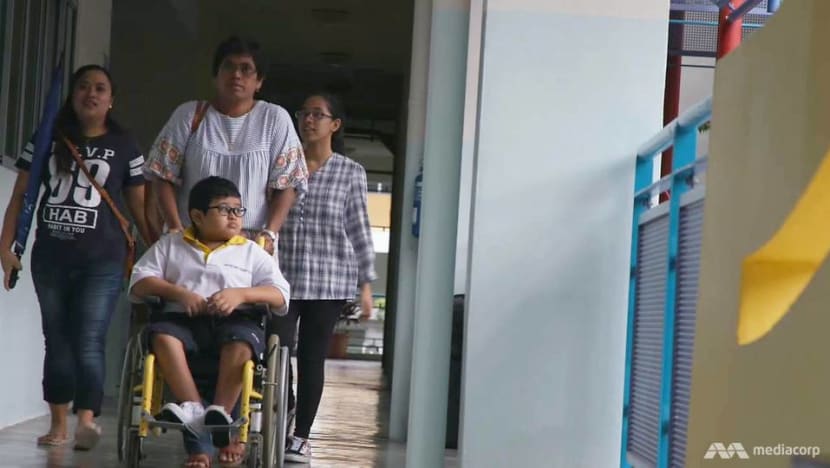
Indeed, perseverance is a must-have not only for him, but also his parents. For it takes a lot to care for children with disabilities, as the programme On The Red Dot finds out in following the lives of three families. (Watch this episode here.)
They have to battle disappointment, face up to their limitations and beat the odds as a family.
TRIAL AND ERROR
One of the reasons it has been a “struggle” for the Pohan family is that it has been a process of “trial and error”, with no one to teach them, said Mdm Siregar.
For example, one time when they used a baby carrier to take Tamimi out, he suffered a fractured leg. “So from there, we learnt what we could do and what we couldn’t,” she added.
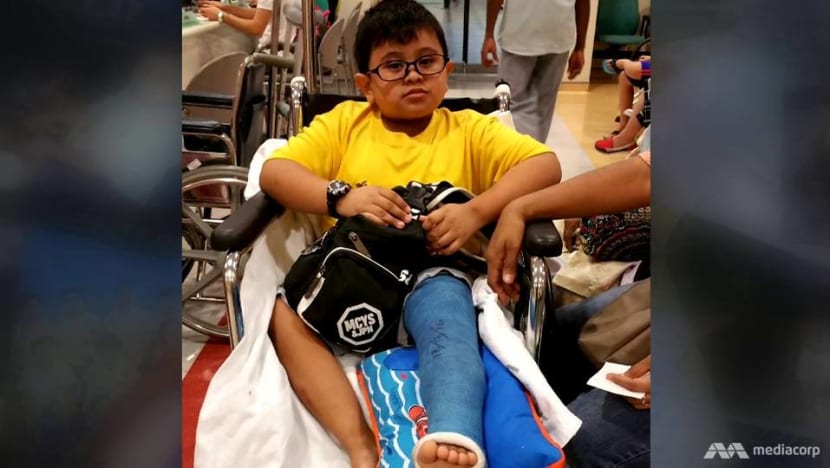
They must be “extra careful” not to let him fall, said his father Muliadi Pohan. But even holding him too hard would break his bones.
It was easier previously, as Tamimi was not fully wheelchair-bound. But after a femur fracture in 2016 and a spinal injury last year, it became safer for him to stay in his wheelchair instead of trying to walk with assistance.
“When he moves, there’s a pain,” said his mother.
He must wear diapers owing to the difficulty of going to the toilet and also the fact that he is in a plaster cast most of the time.
Every morning, his father carries him out of bed on to the floor, and then he crawls to the bathroom. Mr Pohan, who has had a heart attack, cannot carry his son much more than that.
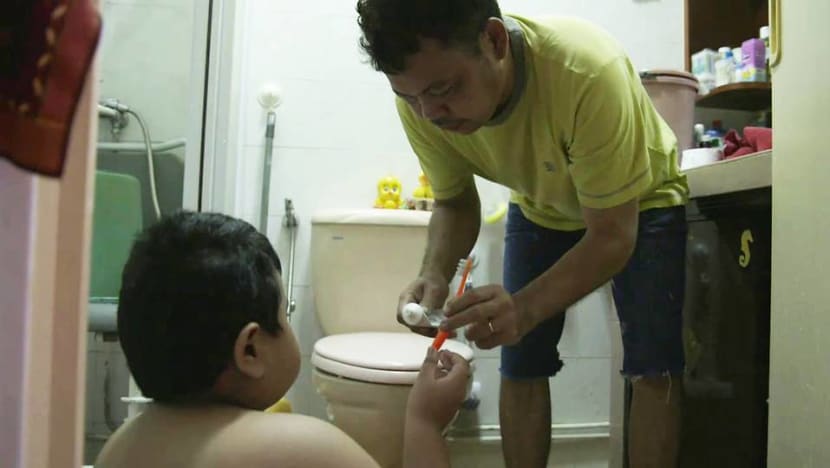
Said the teenager: “Crawling on the floor to the bathroom is dirty, but I have no choice.”
Added his father: “When I see Tamimi dragging himself across the floor, I feel sad. But I also have to let him be independent for the sake of his future.”
His mother sometimes feels another kind of sadness when they go out and she hears certain remarks people make.
“They say that this boy is naughty. That’s why he fell down and he’s in a cast,” she cited. Then there are others who say her son’s illness must be “karma for what (we’ve) done”. This, she said, “really hurts”.
MONEY MATTERS
At the same time, Mdm Siregar has felt the kindness of strangers. She uses the crowdfunding website Give.asia to raise money for Tamimi’s transport, tuition and diaper expenses. And there have been willing donors.
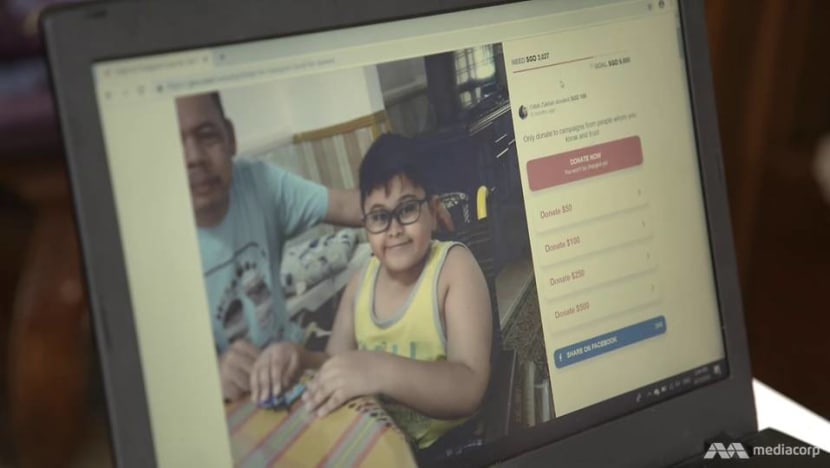
Her son needs wheelchair-accessible transport like vans or London cabs, and the family spends S$1,600 a month on his rides alone.
With a combined monthly income of around S$5,000, they are middle-income parents – she does administration work, and her husband is a production operator – so getting help from agencies for their family “isn’t easy”, she said.
In the months when they are short of money, the couple must decide what payments to make and what to defer.
On one occasion, for example, they paid half of the utilities bill, hoping to pay the balance the next month. That was the same approach Mr Pohan suggested when it came to the day-care centre fee for his mother-in-law.
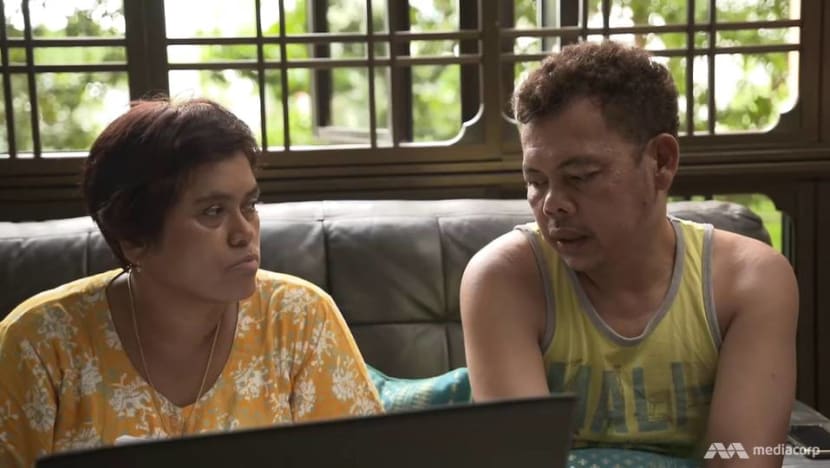
“Call them and ask if we can pay for a month first. When we have the money later, we’ll pay for the second month,” he told his wife.
Tamimi is well aware of the financial situation. Around seven months ago, he made a video to thank his Give.asia donors. And more recently, after his Primary School Leaving Examination, he suggested staying at home, instead of going to school.
“No need (for me) to go to school because there’s nothing there to do,” he told his parents. “There are no lessons. Why not … keep the (transport) money for the future?”
Sharing his thoughts later, he said: “I feel sorry for my parents because they have to take care of me all the time.”
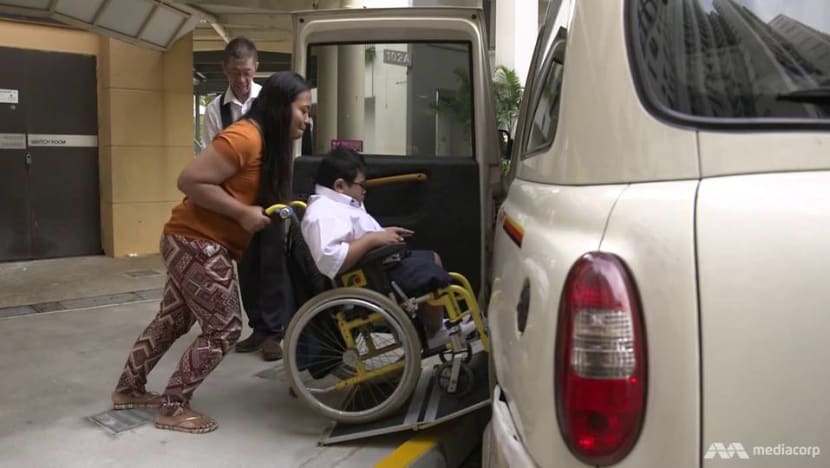
FAMILY TIES
Despite the challenges, Mr Pohan is not the kind to complain. “As the head of the family and the husband, I’ve tried my best,” he said. “For the sake of my family, I’ll keep on fighting.”
There are times when he has money to spare, and can pay for a taxi to take Tamimi fishing. The fare can go up to S$50, he said, but fishing is one of the things both father and son enjoy.
“When I see him catch a fish, he’s happy and I’m happy for him too,” said Mr Pohan. “I’d lose all my worries and problems that I keep inside … when I see Tamimi enjoying himself.”
The two have a “very close relationship”, he added. “I don’t regard him as a son but more as a friend.”
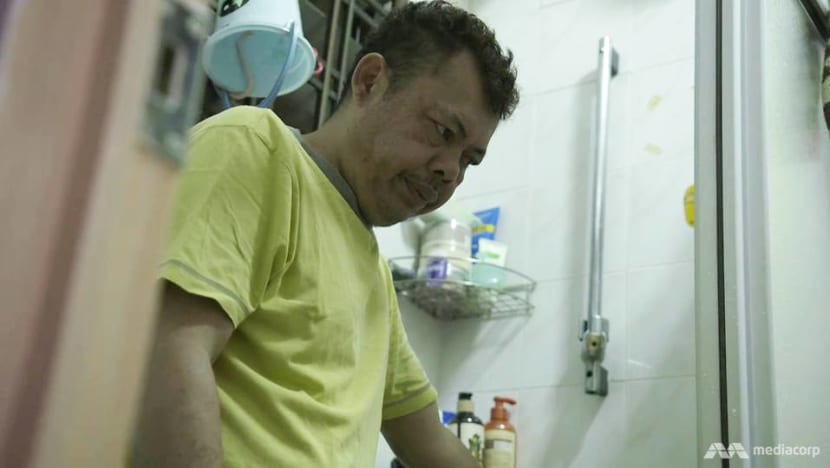
Just as both parents show Tamimi their love in ways big and small, he does the same to them. “I’d hug them and kiss them and say that I love you,” he said.
While he may be suffering from a rare genetic disorder, they take care of him “as if he’s a normal person”, said his father.
It’s just that sometimes we cannot but think about how his future would be like when we’re old.
“I feel sad wondering how he’d manage after I’m gone, how he’d live, what his future and his marriage life would be like. Whatever happens, we’ll accept it and continue to live our lives on a day-to-day basis," he added.
Tamimi has an 18-year-old sister, Tiurma. And his other "sister" is their domestic helper Dwi Lestari. Having the latter around, said Mdm Siregar, “isn’t a luxury but a need, for looking after Tamimi”.
After about nine years of working for the family, Ms Lestari does not see him as just a boy she takes care of.
“Tamimi knows I'm only the helper, but Tamimi always tells me, ‘You’re not my helper, you’re my sister,’” she said. “He’s like my friend, my brother. I can talk to him (about everything), when I'm sad and when I’m happy.”
Agreeing that they are close, he said: “We watch television together … and we’d always share our thoughts.”
WISHES COME TRUE
One group whom Tamimi is not close to are his classmates. “I don't have any good friends in school. I think I'm physically different from them. It makes me feel sad,” he said.
When others see me, they’d give me a weird face and stare at me. I’d just ignore and not think about it any more because it's better to ignore.
He had always wanted to share with them how he felt as a pupil with a disability. And he finally did so after deciding to give a speech to his school, Gan Eng Seng Primary, on its graduation day.
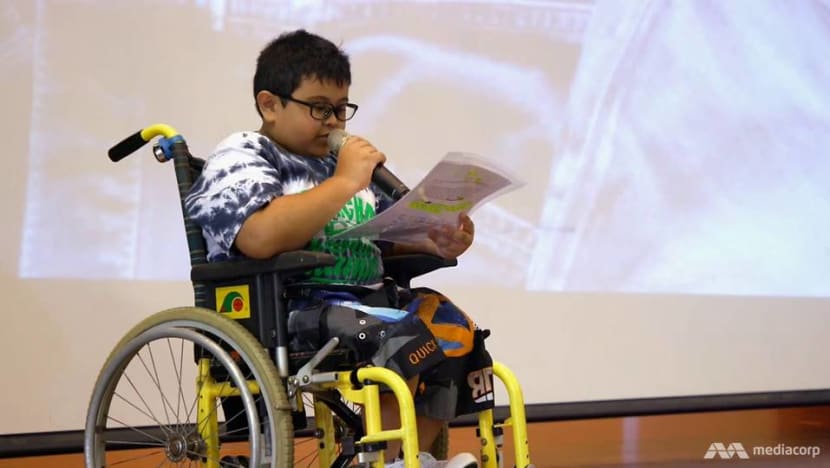
“Sometimes I don't feel like going to school because during recess, when all of you play in the canteen, I was in the classroom having food with my helper. When you all went for swimming lessons, I was left alone,” he told them.
“I hope that the school can give support to special needs people, especially those who are in a wheelchair, like me.”
To the On The Red Dot team, Tamimi and his family were an inspiration. So on his birthday, the team offered to pay for a professional photo-shoot, as none in the family has ever had a family portrait.
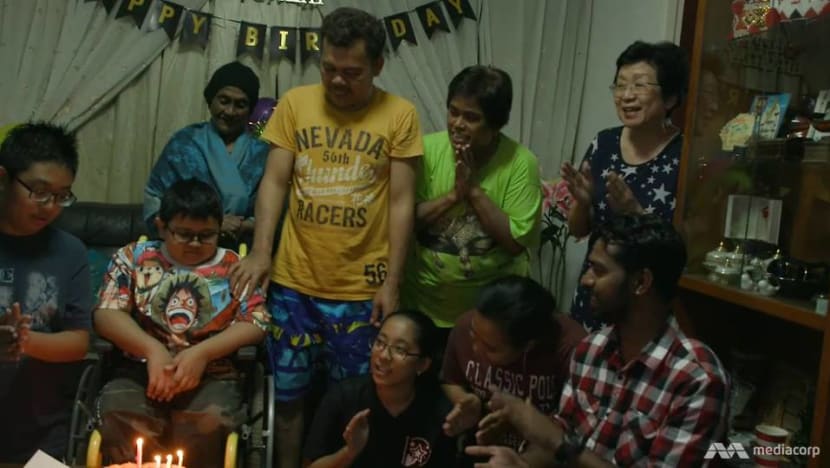
“I didn’t think that we could do a photo-shoot, as it wasn't really affordable for my parents,” he said.
Besides getting the portrait of their dreams, they got to cherish “family bonding time” on the day of the photo-shoot, said Tiurma.
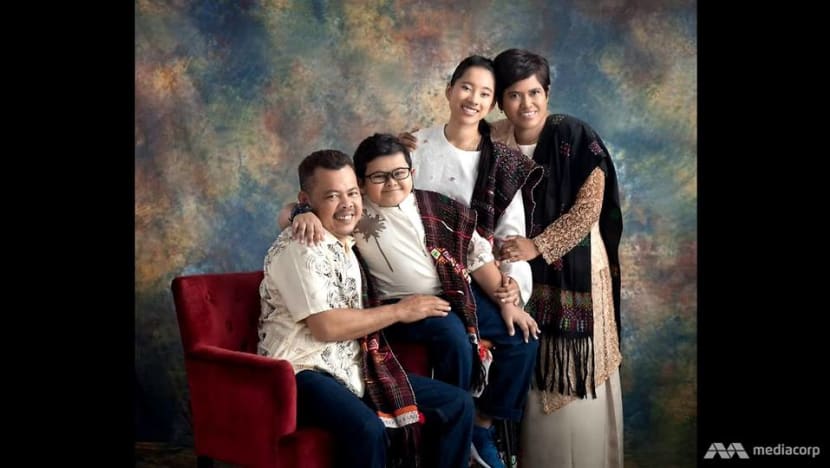
Her brother’s actual birthday wish was to “have many, many cars and to graduate and go to secondary school”.
While the cars will have to wait, the PSLE results were released last month. And before he got his result slip, Tamimi was a bundle of nerves in his school hall, “scared” that he might have to repeat Primary Six.
But he made it to the Normal (Academic) course and was “very happy” with his score of 160. He also identified his first-choice school: Outram Secondary “because there’s wheelchair accessibility there”.
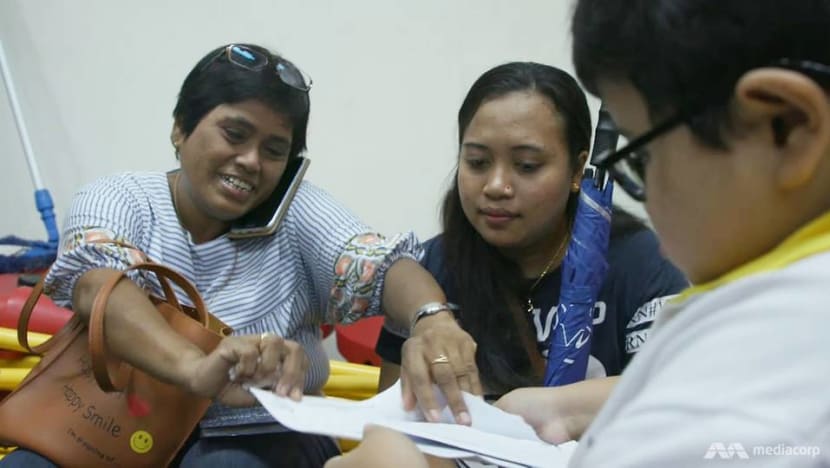
It was also an emotional moment for his mother, who exclaimed as she hugged him: “My efforts have not gone to waste.”
Amid the tears and the excitement, she said: “My heart, from the beginning of the year, already said that Tamimi can do it.
“I always tell myself that I want Tamimi’s future to be better than mine and to be a success and to be better in any way.”
Watch this episode here. New episodes of On The Red Dot air on Mediacorp Channel 5 every Friday at 9.30pm.














